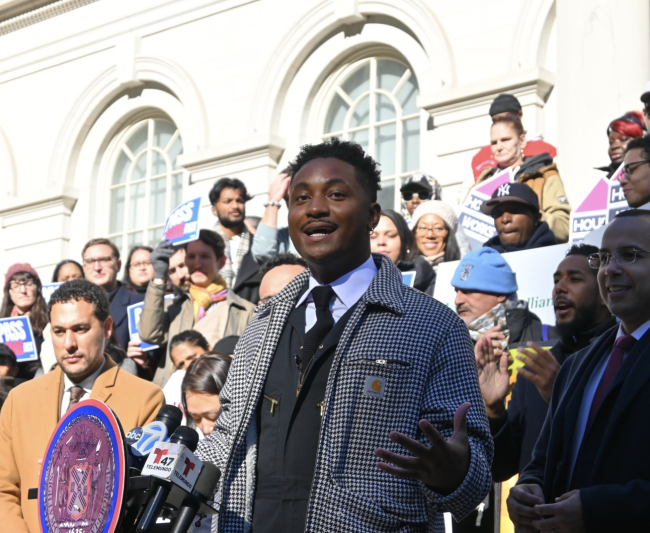A wet, hot, broker fee-free summer? A major change to rental broker fees is supposed to start in June
- The FARE Act requires landlords to compensate the brokers they hire
- The new law is scheduled to take effect on June 11th unless a lawsuit derails it
- If a broker advertises a listing, they cannot collect a fee from a renter under the new law

Assuming the FARE Act goes into effect on June 11th, renters signing leases after that date will see an upfront financial obstacle removed.
iStock
June 11th. That’s the day New York City renters could be free from paying a broker fee for agents who work on behalf of landlords—a longstanding practice that has frustrated legions of renters.
A new law, the Fairness in Apartment Rentals (FARE) Act, would require landlords to pay the broker they hire starting on June 11th, according to the NYC Department of Consumer and Worker Protection. The new law would be a relief for renters looking to avoid the hefty fee, but the FARE Act adds a lot of unknowns to what’s likely to be a hot summer rental market.
The biggest question is whether the FARE Act will actually go into effect as scheduled. The Real Estate Board of New York and a handful of brokerages sued to block the law in December. The court heard REBNY and the city’s arguments at the start of May, just over a month before the FARE Act is expected to start.
If it does go into effect, it’s yet unclear how the city’s brokers will respond—and few large brokerages were willing to discuss the change. Brick Underground reached out to eight of the top brokerages in NYC to talk about what renting under the FARE Act could look like, and only three agreed to chat.
One thing is for certain: Renters planning to move this summer need to be ready for a lot of unknowns.
“This is obviously going to be different for the city—it's a bigger change,” said Matt Stouffer, CEO of Keller Williams NYC. “But there have been bigger changes than this, and we’ve made it through. And everybody’s ended up in even a better spot than before.”
A presumption of no fee
Under the FARE Act, you shouldn’t have to pay a fee to a broker to rent an apartment that a broker has advertised.
The law states that any agent who publishes an apartment listing, with permission from the landlord, cannot collect a fee from the renter. Previously, brokers could ask a renter to pay even if they had listed a unit for the landlord.
“If you contacted a person and you're renting the apartment that they advertised, then they do not work for you and you do not pay,” Anna Klenkar, a broker who has her own agency. “They are not allowed to charge you because they are advertising and representing that [apartment] on behalf of a landlord.”
Klenkar was one of the few brokers who testified in support of the FARE Act when it underwent a grueling, marathon City Council hearing in June. She said she worried that brokers could try to get around the new law by advertising some no-fee apartments, and then when a prospective renter gets in touch, asking them to sign an agreement to pay the broker to see other units.
Fines for bad behavior
The FARE Act specifically prohibits brokers from “condition[ing] the rental of residential real property on a tenant engaging any agent,” but renters will still be on the hook for a broker fee when they hire a broker themselves.
That could open the door to unscrupulous brokers pressuring renters into hiring them, said Jared Antin, managing director and broker at Elegran Forbes Global Properties.
“I believe it's unethical to have someone show up at a property and sign something to go in and see it,” Antin said. “Can I envision brokers doing that? Unfortunately, yes. But it's not the way that I would ever operate.”
If the FARE Act does go into effect, it’ll be up to the Department of Consumer and Worker Protection (DCWP) to enforce the law and fine bad actors. But as Curbed reported in April, fines for the FARE Act are lower than most broker fees.
A broker can be fined $500 to $2,000 for violating the FARE Act, according to the law. The New York Department of State, however, can impose additional fines of $2,000 and could revoke a brokers license on top of any penalties under the FARE Act, said Mercedes Padilla, spokeswoman for the Department of State.
As of June 11th, renters will be able to complain to the DCWP if a broker violates the law by calling 311, and can make a complaint to the DOS by filling out this form and emailing it to the agency. But how the law will be policed remains to be seen.
“There needs to be an enforcement arm,” said Jordan Melkin, an agent at Pepe Real Estate who supported the FARE Act in its City Council hearing. “But hopefully, tenants will have the confidence to, as a consumer group, say that they shouldn't be forced to pay for this… And hopefully they will bring that attitude to the market.”
Know what you’re signing, and who you’re hiring
A broker should disclose whether they work for the landlord or would like to work for you. Unless you have a contract with a broker, you don’t have to pay them, said Daniel Marrello, sales manager and broker of record at Compass, in a statement to Brick Underground.
“Renters should know that they’re not obliged to pay a broker fee unless the broker is working directly on their behalf under a contract or written agreement,” Marrello said.
Almost every broker recommended that renters have a frank conversation with the brokers they meet when apartment hunting to clarify who they work for.
“The conversation is really just about who works for who,” Stouffer said. “If you’re meeting this person through StreetEasy or Zillow or whatever, make sure you understand what that person's job is.”
If you do hire a broker, you should know that broker fees are always negotiable and can range from 10 to 15 percent of the annual rent. And you should expect to be asked to sign a renter agreement, which outlines the fees you agree to pay the broker after you’ve found an apartment. Other than that, the rental process should be fairly similar to past years.
“There may be additional disclosures and a written agreement if the broker represents the renter, but the overall rental process remains the same,” Marrello added.
Should I wait until June to move?
When you move largely depends on your individual circumstances: when your lease is up, when you have the time to pack up your stuff, or when you can schedule a mover.
If you want to move but don’t want to fork over a broker fee before June 11th, you can search online for no-fee rental apartments or try to negotiate a lower fee. Or you could wait until after the FARE Act goes into effect, assuming it’s not stalled by REBNY’s lawsuit.
“If you have the option of looking at the end of June instead of in May, that might be great,” Klenkar said. She cautioned that “rents do tend to go up in the summer, but we’re kind of in no man’s land.”
If the FARE Act is struck down or stalled in court, you might end up delaying your move in vain. But two legal experts have said that the lawsuit seems unlikely to succeed, and Governor Kathy Hochul recently threw her support behind the FARE Act in a video she and Council Member Chi Ossé, who introduced the bill in the City Council, released in April.
A representative for Ossé did not respond to a request for comment for this story.



























